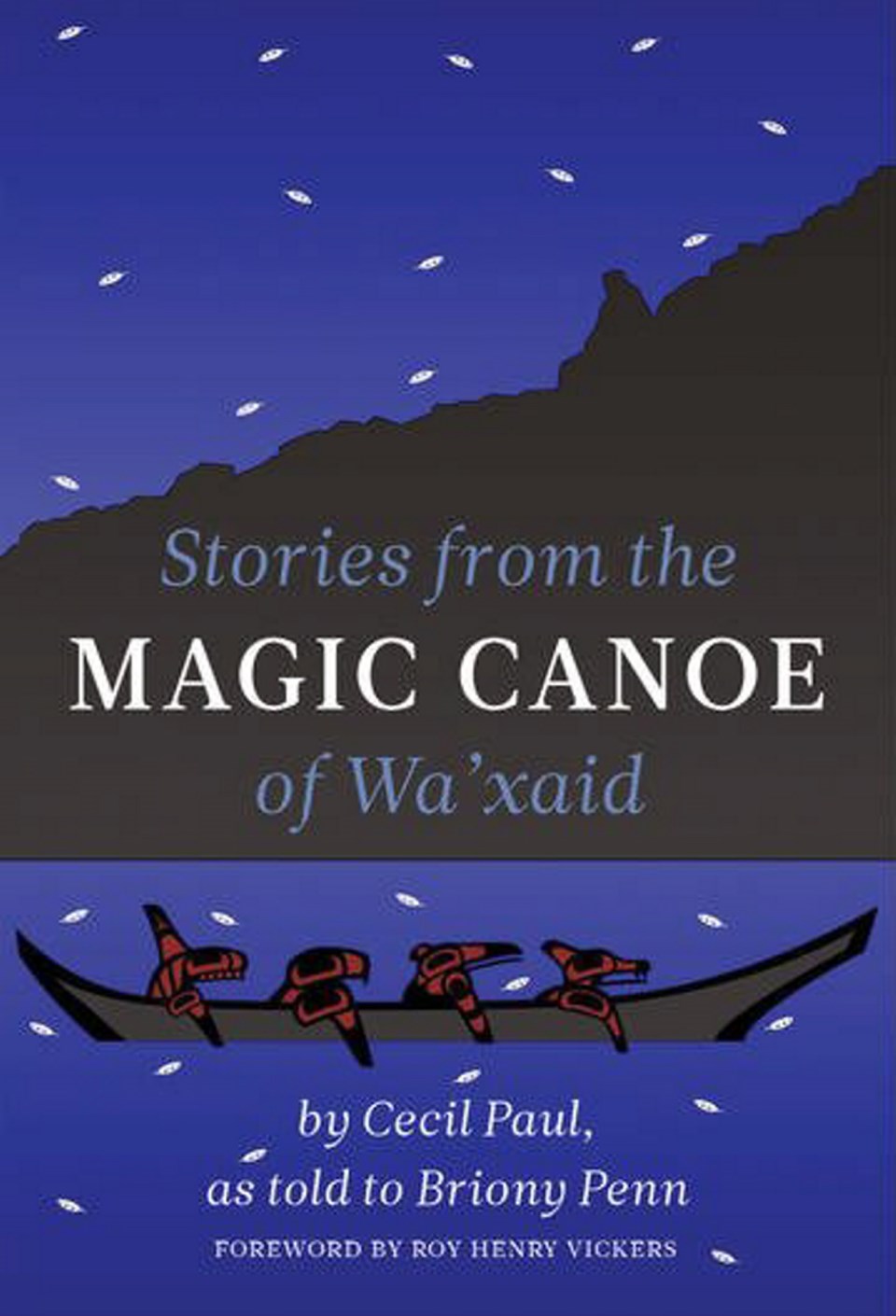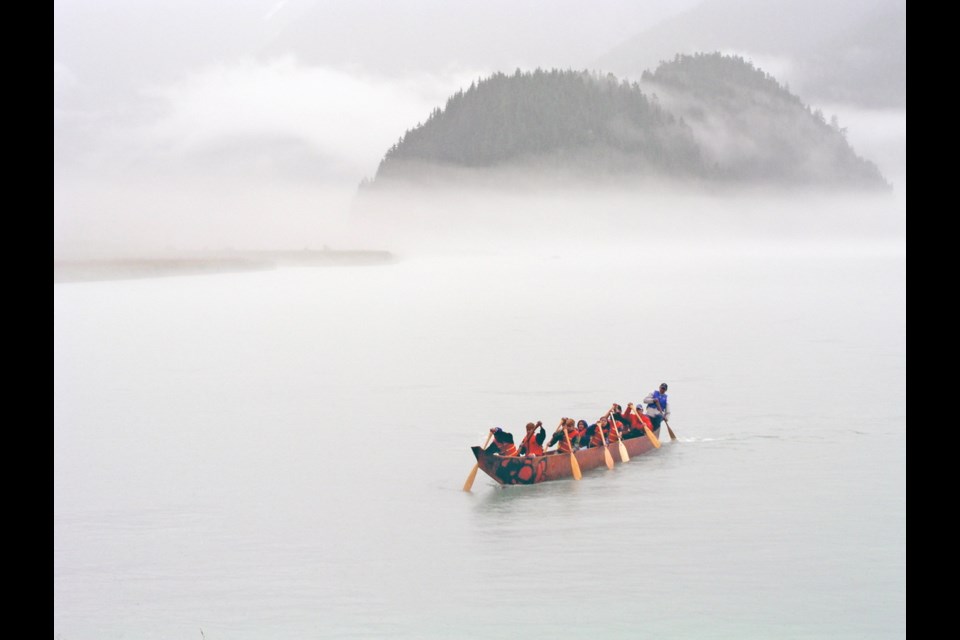Who better to tell the narrative of our times about the restoration of land and culture than WaŌĆÖxaid (the good river), Cecil Paul, a Xenaksiala elder who pursued both in his ancestral home, the Kitlope ŌĆö now the largest protected unlogged temperate rainforest left on the planet. PaulŌĆÖs cultural teachings are more relevant today than ever in the face of environmental threats, climate change and social unrest, while his personal stories of loss from residential schools, industrialization and theft of cultural property (the world-renowned GpsŌĆÖgolox pole) put a human face to the survivors of this particular brand of genocide.
 Told in Cecil PaulŌĆÖs singular, vernacular voice, Stories from the Magic Canoe of WaŌĆÖxaid spans a lifetime of experience, suffering and survival. This beautifully produced volume is in CecilŌĆÖs own words, as told to Briony Penn and other friends, and has been meticulously transcribed. Along with PennŌĆÖs forthcoming biography of Cecil Paul, Following the Good River (Fall 2019), Stories from the Magic Canoe of WaŌĆÖxaid┬Āprovides a valuable documented history of a generation that continues to deal with the impacts of brutal colonization and environmental change at the hands of politicians, industrialists and those who willingly ignore the power of ancestral lands and traditional knowledge.
Told in Cecil PaulŌĆÖs singular, vernacular voice, Stories from the Magic Canoe of WaŌĆÖxaid spans a lifetime of experience, suffering and survival. This beautifully produced volume is in CecilŌĆÖs own words, as told to Briony Penn and other friends, and has been meticulously transcribed. Along with PennŌĆÖs forthcoming biography of Cecil Paul, Following the Good River (Fall 2019), Stories from the Magic Canoe of WaŌĆÖxaid┬Āprovides a valuable documented history of a generation that continues to deal with the impacts of brutal colonization and environmental change at the hands of politicians, industrialists and those who willingly ignore the power of ancestral lands and traditional knowledge.
The Place of My Birth: ŌĆ£They call it the KitlopeŌĆØ
My name is WaŌĆÖxaid, given to me by my people. Wa is ŌĆ£the riverŌĆØ; Xaid is ŌĆ£goodŌĆØ ŌĆö good river. Sometimes the river is not good. I am a Xenaksiala; I am from the Killer Whale Clan. I would like to walk with you in Xenaksiala lands. Where I will take you is the place of my birth. They call it the Kitlope. It is called XesduŌĆÖw├żxw (Huschduwaschdu) for the ŌĆ£blue, milky, glacial water.ŌĆØ Our destination is what I would like to talk about, and a boat ŌĆö I call it my Magic Canoe. It is a magical canoe because there is room for everyone who wants to come into it to paddle together. The currents against it are very strong, but I believe we can reach that destination, and this is the reason for our survival.
When you leave Kitamaat, this is Haisla Land, you go out to ŌĆö they call it ŌĆö Gardner Canal. You go into Gardner, and Crab River is where our boundary line was before the amalgamation of the Xenaksiala and the Haisla. Haisla and Xenaksiala share the same language, with a few word differences. Our language is close to the language family of RiverŌĆÖs Inlet. You can get the Haisla history from Gordon Robinson.
When I bring the boat into Xenaksiala land, the tide will bring us through. There is a story for that. From Crab River we enter the Kitlope Valley. The Kitlope has many, many rooms, many doors ŌĆö there is a lot of history going up to Kitlope Lake. Kitlope Lake, if we manage to journey that far, it is what I call the cathedral ŌĆö a spiritual place. It is quiet. I think if you experience something when we get there, our people say that you will not leave that place unchanged. You cannot leave the way that you went in. Something touches you. Something grabs within you that you never identified as yours, but something in there reveals a little of who we are.
When we get to the Kitlope, I am going to ask you to wash your eyes. Our story says that though you may have 20/20 vision or glasses that improve your vision, we are still blind to lots of things. We are blind to Mother Earth. When you bathe your eyes in the artery of Mother Earth that is so pure, it will improve your vision to see things. I will also ask you to wash your ears, so you could hear what goes on around you. So, I could hear you talk. I could hear the wind, and you can hear the birds and animals. If you have the patience to listen, to hear the songs of the birds early in the morning, all these things will be open to you.
We are so busy, we donŌĆÖt have the time for all these beautiful things. If you have the willingness and courage to do that, you will see little things that you have never seen before. You will take a better look at your children, your grandchildren, your best friend. YouŌĆÖll say: ŌĆ£Oh, I never saw that before.ŌĆØ To get that vision back ŌĆö and when you get that back ŌĆö you will be more kind to whoever comes in your path on this journey. There are many legends that we talk about to our children, and above all, the people around the universe that came with their love and compassion to save something that is known around the world ŌĆö the largest unlogged temperate rainforest in the world.
So Many Arrows Came┬ĀOur Way
When they were mapping out the reservations, the government sent a guy out to tell the Haisla what their reservation is going to be. Our big chief told him, ŌĆ£WaŌĆÖwaisŌĆØ ŌĆö the mountain tops where the first little stream starts from the mountain and comes down to our valley, to the hot spring. All the way down the channel as far as Butedale and all the way up to the headwaters of the Kitimat. As big chief, he knew all the boundary lands of different waŌĆÖwais, down the coast and further back. ŌĆ£ThatŌĆÖs home. ThatŌĆÖs all our place.ŌĆØ And the chiefs try to tell this guy [the surveyor], they ask: ŌĆ£Who was speaking for the Haisla?ŌĆØ And that guy didnŌĆÖt listen. He wrote to the Indian Agent: ŌĆ£The Haisla had 35 acres,ŌĆØ and he described this village. ŌĆ£This place here, you canŌĆÖt cultivate it. CouldnŌĆÖt plant nothing, itŌĆÖs all rocks. ThereŌĆÖs a little stream coming down, thatŌĆÖs the one you cross and either side of the river is rows of wild crab apples, which the Indians like. Your obedient servant.ŌĆØ
That whole valley of people, the Haisla people with the oolichan fishing, only got a small little portion of Haisla land where they grew up, but that whole valley was Haisla. The chief asks: ŌĆ£What is this 35 acres of rocky soil? Concentration camp for Haisla people?ŌĆØ This was just a summer camp; they didnŌĆÖt understand that. Kitlope was no different. That was when you start to mistrust. IŌĆÖve often wondered what would have happened if some guy had written back: ŌĆ£NobodyŌĆÖs going to educate the Indian. We got a few crab apples. Your obedient servant.ŌĆØ
There was a bad friction between the Indian Agent and the chiefs. They told him, ŌĆ£You canŌĆÖt have that, thatŌĆÖs our home. Why are they putting this reservation there?ŌĆØ But our people didnŌĆÖt know what was happening. They had a sense that these people were bad. There was an argument. And from Victoria, they had a war ship called Clio, which came and anchored there. Now it is Clio Bay. Was it to quiet the Natives down? I donŌĆÖt really know.
Annie Paul, the queen of my family, was 96 years old when she died. Her husband is Chief Johnny Paul, Chief Humzeed. My mother Clara, who holds the title of the great chief lady, which my brother Dan held, Chief GŌĆÖpsgolox. And that is her husband who is the Killer Whale Clan chief, Thomas Paul, my father. He was only 42 years old when he died of tuberculosis. Very young. My auntie, his sister, died too, only 40. My brother, Leonard ŌĆö they talk about the Miller Bay Hospital ŌĆö that is where my brother died in the TB hospital in Prince Rupert, only 20 years old.
A year and a half later, after he passed away, the miracle drug they called streptomycin came in. All the hospitals were filled with my people ŌĆö Miller Bay, Coqualeetza, Nanaimo ŌĆö all army and air force hospitals, were filled with Indian people with tuberculosis. Inside one year when streptomycin came in to hospitals, a miracle happened. Wish my brother had lived long enough to see the miracle happen. I praise society for coming up with something to penetrate that thing that tuberculosis has ŌĆö the germ. No other drug would penetrate that to arrest what took my people.
Now only four of us left ŌĆö four full-blooded Xenaksiala people. Three ladies: my little sisters Louisa and Vietta, and Lillian Henry, my cousin. Now, out of 700 or more, youŌĆÖre sitting across from the only male left from Kitlope. Kemano cemetery is where I am going to be when I go to sleep. So many arrows came our way.
Grizzly Bear: He┬ĀHolds┬ĀUp┬ĀEverything
I brought three scientists up to see what I was shown by my Xenaksiala teachers. Grizzly bear, all kinds of grizzly bears and different colours: orange and yellow. They spot at age. Some of them are pitch black; some of them are light brown with white faces. It is very unusual. My people never touch a grizzly bear. They drilled into us when we were young, that heŌĆÖs our friend in the bush. He is my brother; he is a guardian of the forest. All Xenaksialas hold this. The totem, you study the images of what is put down, and always at the bottom is the grizzly bear. He is strong; he holds up everything. What is on the top? The majority of the poles will have the eagle on top. The vision the eagle has is sharp. HeŌĆÖs guiding everything above, and you often see that in the Kitlope.
One day, a grizzly hunter guide comes looking for grizzlies, and I heard him say that he would shoot through the Indian children at the camp to kill a grizzly bear. I say to him: ŌĆ£These are not only Haisla children but children from around the world, and you threaten to shoot through the children?ŌĆØ I talked to him by the little creek: ŌĆ£Say to me please, ŌĆśIŌĆÖm sorry.ŌĆÖ ŌĆØ
He said: ŌĆ£WaŌĆÖxaid, IŌĆÖm sorry.ŌĆØ
But what is he sorry about? He didnŌĆÖt elaborate on that word. Sorry to shoot through that child? Sorry because I met with him? Maybe because I didnŌĆÖt accept the apology? I never met him again after that. We have a word for a type of grizzly that is angry or a killer; it is called gil dee spa.
Many Doors Opened┬Āfor┬ĀWaŌĆÖxaid
Many doors opened for WaŌĆÖxaid. In my journey, I think the beauty of it was ŌĆö and I tell this to the children, and to Elders ŌĆö I said: ŌĆ£I trust them, I trust them, and thatŌĆÖs where the trust begins. WeŌĆÖre going to save the Kitlope with a race I hated and distrusted.ŌĆØ
The book launch for Stories from the Magic Canoe of WaŌĆÖxaid is Saturday, May 4, from 2-4 p.m. on the Cascadia catamaran docked at Ship Point Marina.
Excerpted from Stories from the Magic Canoe of WaŌĆÖxaid by Cecil Paul and Briony Penn (Rocky Mountain Books, 2019)



